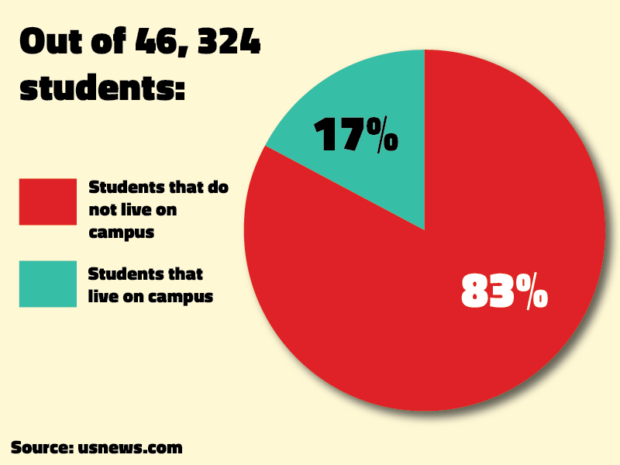

Jiselle Santos/The Cougar
Commuting is a huge part of the University’s soul: roughly 83 percent of students commute instead of living on campus.
But driving in a city ranked as one of the worst for traffic, parking passes that students complain are too expensive, and the difficulty of managing travel times with classes and socializing, students who commute face many challenges that on-campus residents don’t.
Marti Trummer-Cabrera, Counseling and Psychological Services psychologist, said mental health might be impacted, or existing issues made worse while commuting.
“Feeling angry or scared while navigating traffic is more likely to occur the more we are on the road,” Trummer-Cabrera said. “These feelings may become more of an issue for someone already managing a mental-health concern.”
For the most part, commuter students said they feel isolated from their networks because of commuting.
Students also said they stressed over traffic and preparations for the day. After all, if they forget a necessity, it’s not a simple walk to their residence hall to fix it.
“Being so far from home I’m always stressing about if I have everything,” said Spencer Vandigriff, a flute performance and music junior. “It’s definitely impacted my mental health.”
Lost time
The average commute time for drivers in the Houston-Woodlands-Sugarland metro area is about 30 minutes one way.
“Students are under pressure to be productive with their time, which is more difficult to do when time is devoted to commuting,” Trummer-Cabrera said.
That time spent driving is less time for studying, socializing, exercising or tending to self-care.
Vandigriff said he has resorted to practicing his flute in his car to make up for the lost time.
Cutting into class
Trummer-Cabrera said commuting students sometimes cite trouble with grades, mostly because they struggle to get to class on time or want to leave early to avoid congested roads.
“I usually do pretty well of leaving my house with enough time to make it to class early,” said public relations junior Alberto Huichapa, “but there have been instances where road construction or an accident puts me back, and I’ll barely make it to class on time or be late.”
Commuting could be detrimental to grades, Trummer-Cabrera said, especially if the class has attendance-based scores.
“The commute eats two hours of my day each day I go to class, and that time could be used to work on assignments,” said advertising senior Carlos Malespin. “Traffic has repeatedly made me late and occasionally made me absent simply due to the fact of not wanting to deal with the commute.”
Lower costs
The cheapest option for living on campus is a Moody Towers double at $2,690 a semester per student. A required meal plan starts at $1,993 per semester.
Parking passes are also more expensive for students who live on campus. A zone parking permit is $205 more for on-campus residents compared to what commuters pay.
For mechanical engineering freshman Tommy Nguyen, the convenience isn’t worth it.
“I’d probably choose to live on campus if it wasn’t for the high costs,” Nguyen said. “You can save quite a bit of money (commuting).”
Easing the impact
The University provides resources to commuters to ease the burden of driving, parking and walking more than the resident students.
Parking and Transportation Services offers a carpool program that provides discounted parking passes and guaranteed spaces to groups of three or more students driving together, and 50 percent off Metro fares with a reloadable student card.
There is also the Commuter Assistant Program, which offers peer guidance and networking to incoming commuter students.
news@thedailycougar.com
—
“‘Under pressure’: students stress over commuting’s toll” was originally posted on The Daily Cougar
